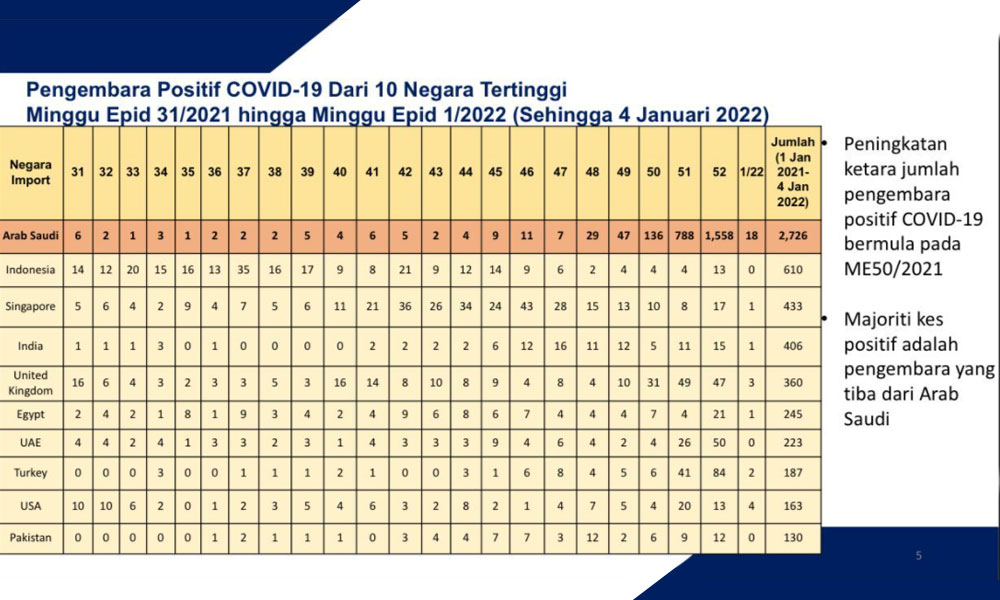If preventative measures regarding the umrah pilgrimage had not been taken, it is estimated the daily number of Covid-19 cases in the country would have crossed 15,000 between January and February.
Health Minister Khairy Jamaluddin said even if Omicron cases tend to be milder than Delta variant cases, an increase in cases would lead to an increased hospitalisation rate.
This would in turn burden the country’s healthcare system which is just starting to recover from the previous Covid-19 wave, he said.
“We conducted a simulation for Omicron and the prediction is that if we had not taken preventative measures such as the temporary suspension of umrah as well as quarantine measures and so on, we would have seen our cases jump up to more than 15,000 cases a day starting January to February,” Khairy said.
He was speaking during a press conference today which was held in Parliament and live-streamed online.
He added that the simulation showed if the R-naught for Omicron in Malaysia reached 1.6 – which is about half of what the UK experienced at the peak of its Omicron wave – the daily cases would have reached 30,000 a day.
“Yes, so far, we have found that the Omicron variant is a milder infection compared to the Delta variant.
“But when our cases hit 30,000 a day, even if most of them are Category 1 or 2, our hospitalisation rate will increase and our healthcare system is just starting to recover,” he said.

As of Oct 30, 2021, government hospitals nationwide still had a backlog of 52,189 cases for elective treatment, of which 47,828 are surgical-based and 4,361 were medical-based cases, he said.
This refers to non-Covid cases whose treatment had to be postponed to make way for the overwhelming influx of Covid-19 hospitalisations during the third wave last year.
Khairy said the Health Ministry has attempted to reduce this backlog by outsourcing some cases to private hospitals as well as reopening operating theatres in government hospitals in stages starting last October.
He further defended the government’s decision to temporarily suspend the umrah pilgrimage.
He explained that pre-departure testing in Saudi Arabia – two days before the pilgrims’ return to Malaysia – does not appear to be effective enough in detecting positive cases among the returnees.
This is because there is a high number of positive cases found among those returning from Saudi Arabia when they are tested upon arrival in Malaysia, as well as when they get tested on day five of their quarantine.
Between Dec 1, 2021 and Jan 5, 2022, there were 1,380 positive cases detected from testing upon arrival among returning umrah pilgrims, while another 1,311 cases were found to be positive from day five tests.
“These are people who were negative in their pre-departure tests and positive upon arrival.
“This shows that the pre-departure test in Saudi Arabia was not able to detect these cases and if we had not made the decision to quarantine the umrah pilgrims and postpone umrah pilgrimages, then we will see a much worse Omicron wave,” Khairy said.
It was previously announced that the government decided to temporarily suspend umrah trips to Saudi Arabia for a month, starting Jan 8, amid a surge of infections among people returning from that country.
When asked if Putrajaya would impose another lockdown to slow the spread of Omicron variant cases, Khairy immediately refuted this.
“No, no, no, no, don’t mention the L-word. We don’t mention the L-word anymore.
“We are not looking at lockdowns or border closures for now. If you lockdown, you get zero cases, but at what cost?
“There are implications to the economy - mental health, physical wellbeing. Our response is and will continue to be calibrated and proportionate,” Khairy said. - Mkini




No comments:
Post a Comment
Note: Only a member of this blog may post a comment.